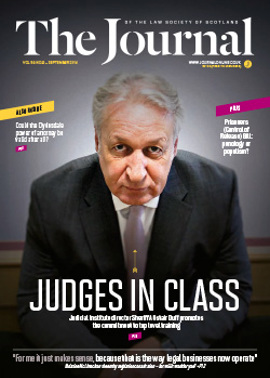Opinion: Joanne Gosney

Medical negligence cases which result in an alleged wrongful death, require consideration of the Damages (Scotland) Act 2011. Sections 3 and 4 provide that where “a person” dies in consequence of suffering personal injuries as the result of an act or omission that gives rise to liability to pay damages, there also arises a liability to pay damages to any “relative” of the deceased, as defined.
The Act has been praised for recognising the changes of modern life in respect of family circumstances, and simplifying the assessment of loss of financial support. However, it makes no attempt to define “person”, in relation to a person who has died. Perhaps it was considered that no definition was needed, given the well recognised principle of Scots common law that until a foetus is born alive, it has no legal personality. As a result, “person” can be interpreted as a human who has achieved independent life even if for only one breath.
We regularly handle cases involving the death of a child in utero, or injuries sustained resulting in live birth but with consequential disabilities. Occasionally, a particular set of circumstances generates further consideration of the concept of legal personality. One case, in which negligence was admitted, founds the basis of this article.
The pursuer (G), expecting her first child (B), had reached the 40th week of pregnancy. On medical checks it was reasonable to assume she was expecting a healthy baby; this was supported by the subsequent post mortem. Unfortunately G developed symptoms of pre-eclampsia which went untreated. Pre-eclampsia can only be cured with delivery. G went into spontaneous labour five days after being discharged from hospital. Following her re-admission, B’s heart rate dropped dangerously low. B was stillborn by emergency caesarean section.
G averred that, but for the defenders’ negligence, she would, on the balance of probabilities, have delivered a healthy child. However, as the child died in utero it cannot sustain personal injuries, and G cannot be compensated for her loss, irrespective of the cause of the B’s death. G’s claim succeeded only on the basis that we could demonstrate that she sustained a diagnosable psychiatric injury as a consequence of the circumstances of B’s death.
It is difficult to explain to bereaved parents that their otherwise healthy, full-term child, stillborn as a result of another’s negligence, does not have legal personality and therefore a s 4 claim cannot be pursued for their loss. It seems cruel, but that is the, perhaps unintended, consequence of the common law. Why do they not have the same rights to pursue a claim as the parents of a child who may survive to take one independent breath and then die? Could the law be fairer?
Perhaps the test should be, but for the defender’s negligence, on the balance of probabilities, would this child have survived? This immediately rules out cases involving prematurity or pre-existing medical conditions, and avoids the inevitable “floodgates” argument. It does however confer legal personality on a foetus in utero, which may call into question the concept of maternal autonomy and supremacy.
It should be borne in mind that I am addressing a very specific set of circumstances – a full-term, healthy child who would have lived but for negligence. While these cases are the exception rather than the rule, they highlight an unfair and sometimes cruel quirk of the law which perhaps requires further examination.
Interestingly, the law does apply retrospective recognition of the legal interests of the foetus when it is subsequently born alive but has sustained personal injuries while in utero, for example birth-related cerebral palsy.
I appreciate that a line has to be drawn, otherwise this could become a “rights of the foetus” argument. However, the law as it currently stands allows the negligent death of a full-term, healthy foetus, to fall in favour of the defender. The defence remains that as the child had no legal personality, the deceased’s parents have no claim. Until such time as this is challenged, as long as the child is stillborn, defenders essentially benefit from their own negligence and have no financial liability to compensate relatives for the loss of a much longed for, healthy child.
In this issue
- Keep the job going?
- Asbestos and the state of knowledge
- Damned lies and bogus statistics
- Sorry seems to be the hardest word
- With a fair RWIND
- Planning land reform: the land of Scotland and the common good
- Reading for pleasure
- Opinion: Joanne Gosney
- Book reviews
- Profile
- President's column
- Roadshows roll out
- People on the move
- Outcomes, or own goals?
- Power and authority
- Licensed to reoffend?
- Raising the bar for the bench
- Title insurance – under the bonnet
- Working for Uncle Sam
- Family failings
- Shopping with protection
- Private sector progress at public sector expense?
- Rent review: the storm before the calm
- Doping: raising the stakes
- New financial services arm for ILG
- Under starter's orders
- Childcare: the benefits
- Law reform roundup
- Follow the leader
- Five years from when?
- Ask Ash
- Take the money?
- From the Brussels office
- Beware the bank calls
- Mentoring – why?






